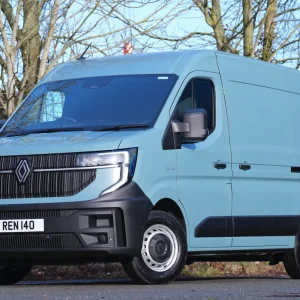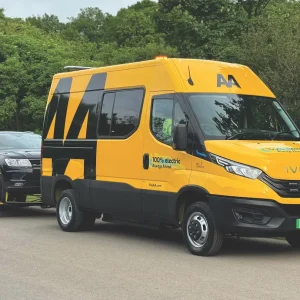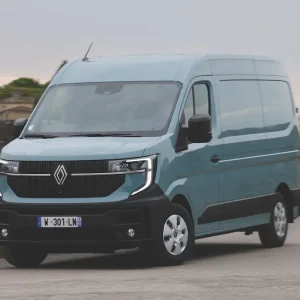With Britain in the grip of recession, many van manufacturers and dealers are worried that cash-strapped businesses will attempt to cut costs by skimping on vehicle maintenance. That’s why there is a flurry of initiatives to ensure that owners keep sending their light commercials back to the dealer’s workshop for servicing at the prescribed intervals.
Special Deals
Volkswagen Commercial Vehicles is the latest manufacturer to highlight the importance of regular maintenance. It’s launched a three-year fixed-cost servicing plan embracing every model in its range. Prices start at £295 and top out at £695. Mileages are banded, with 90,000 miles the maximum. Available to all customers with fleets of up to 25 vehicles who buy a Volkswagen light commercial between now and the end of March, the plans cover all regular service items and can be transferred to subsequent owners.
VW has launched this programme to help counteract the perception that having your van serviced by a franchised dealer is expensive and to stop customers drifting away to independent dealerships as their vehicles get older. So says head of aftersales, Stephen Bateson.
It should also help operators predict their light commercial operating costs between now and 2012 more accurately as well as ensuring that they actually have their vehicles maintained. “We’re expecting a 40 per cent or thereabouts take-up of these plans,” Bateson says.
Yet while initiatives like this have to be applauded, the customer must clearly understand what the programme does and does not cover before he signs up. If he does not, then the scope for disputes and disappointment is endless. “We’re aware of this risk, so dealer sales people are expected to go through the plan with the customer literally line-by-line,” says Bateson.
As it happens VW’s record on service retention is quite good. “About one-third of customers with vans that are four to six years old continue to have them maintained by our network,” he says.
Fixed Costs
VW is by no means the only manufacturer to offer fixed-cost servicing. Vauxhall has launched a highly-comprehensive service and maintenance scheme that includes a replacement clutch and exhaust plus replacement brake discs, brake pads, dampers and four tyres if required. With a three year/60,000 mile limit from the date of the vehicle’s first registration it costs £32.99 a month for Corsavans, Astravans and Combos and £39.99 a month for Vivaros and Movanos.
Something else that’s available through Vauxhall dealers is MoT test insurance. A £75 premium covers a van’s owner against up to £750 of repair work should it fail its MoT. There are a few exclusions, the key one being that the vehicle must be no more than eight years old and have covered no more than 80,000 miles.
Fixed-cost servicing plans underline the fact that light commercials have become a lot more reliable over the past 30 years and require a lot less looking after. If this were not the case, then manufacturers could not offer such programmes without making a thumping loss.
Aftersales Service
The aftersales service provided by dealers has improved over the past 30 years too, even though it could of course be argued that better product reliability and extended service intervals makes such support less essential than it was in the late 1970s.
With an eye to the needs of Transit owners in particular, Ford, for example, has 108 Backbone dealers plus 120 Transit Specialist Dealers (TSD). “So far as aftersales care is concerned the Backbone dealers are centres of excellence,” says Ford commercial vehicles director, Steve Kimber. “Their workshop technicians are trained to a very high standard and they’ve got the skills and the equipment to diagnose and solve difficult problems.”
No matter whether he’s dealing with a Backbone dealer or a TSD, a customer can expect an impressive level of support Kimber contends. “Their workshops tend to be open over 70 hours a week and some of them are in operation round-the-clock,” he says.
Others work late into the evening. “As a consequence the customer is often able to drop his vehicle off when he finishes work and pick it up fully-serviced the following morning,” he says.
Menu Pricing
 Van owners can expect to enjoy the advantages of menu-priced servicing so that they will know exactly how much each service will cost, with no nasty surprises. While-you-wait servicing is available too, says Kimber — at least so far as reasonably straightforward jobs are concerned — and dealers are able to arrange Class IV and Class VII MoT tests.
Van owners can expect to enjoy the advantages of menu-priced servicing so that they will know exactly how much each service will cost, with no nasty surprises. While-you-wait servicing is available too, says Kimber — at least so far as reasonably straightforward jobs are concerned — and dealers are able to arrange Class IV and Class VII MoT tests.
Various manufacturers have offered free servicing schemes over the years in a bid to boost new vehicles sales; Ford among them. Surprisingly they haven’t always proved all that popular says Kimber. “We used to promote a three-year free servicing plan but we didn’t get an enormous take-up,” he recalls. “I suspect it’s partly because we have quite a few customers who have their own workshops and prefer to follow their own maintenance schedules.”
Ford van dealer workshops are being kept pretty busy nevertheless, says Kimber; an indication that some van owners at least aren’t skipping services. VW dealers are busy too says Bateson and he expects the number of workshop hours they sell to show a slight increase this year.
VW has 89 authorised repairers spread across the UK. “As a minimum their workshops have to be open from 8.00am to 6.00pm Monday to Friday, and they have to be open on Saturday mornings too,” Bateson says. “In addition some of them run late shifts and a handful of them stay open for 24 hours during the working week.”
Like many other dealers, VW van centres offer a collection and delivery service for vehicles that need to pay a visit to the workshop plus a courtesy vehicle if the customer’s own van is likely to be in the workshop for sometime. “We try to provide a courtesy van that’s similar to the one that’s being worked on although that can sometimes be difficult if the customer’s vehicle is fitted with special equipment,” Bateson says.
Fast-Fit
 Another reason why manufacturers are eagerly promoting what their dealer workshops have to offer is the competition they face from independent, nationwide fast-fit chains such as Kwik-Fit, ATS and HiQ. These days the description “fast-fit” is something of a misnomer. While Kwik-Fit, for instance, will undoubtedly supply you with tyres, exhausts and batteries — traditional fast-fit fare — and fit them rapidly, some 400 of its 670 outlets can service vehicles too says Mike Wise, head of its fleet operation.
Another reason why manufacturers are eagerly promoting what their dealer workshops have to offer is the competition they face from independent, nationwide fast-fit chains such as Kwik-Fit, ATS and HiQ. These days the description “fast-fit” is something of a misnomer. While Kwik-Fit, for instance, will undoubtedly supply you with tyres, exhausts and batteries — traditional fast-fit fare — and fit them rapidly, some 400 of its 670 outlets can service vehicles too says Mike Wise, head of its fleet operation.
“Sites that offer servicing also carry out over 13,000 car and van MoTs a week,” he says. “The longest you’ll wait before a test is conducted — or for an appointment to have your van serviced — is 48 hours. Typically we charge 20 per cent less than a franchised dealer for a service,” he continues. “That at least is our benchmark figure; sometimes the cost is considerably lower than that.” Menu pricing and while-you-wait servicing are both available and Kwik-Fit outlets will also sort out brake and clutch conundrums.
Training
“Remember though that if you get your VW maintained at a Volkswagen Van Centre then it will be looked after by technicians trained by us who work on VW products day-in, day-out and have all the right equipment and special tools,” says Bateson. “What’s more, if a software upgrade is available that will help your van run more efficiently then the technicians will know about it and implement it.”
While some of Kwik-Fit’s smaller locations will strain to accommodate big light commercials — a Luton-bodied Renault Master for instance — the vast majority can handle most vans grossing at up to 3.5 tonnes. One advantage it has over many franchised and independent workshops is that its sites are open seven days a week. “We close Christmas Day and Boxing Day, and that’s about it,” Wise says. “Otherwise we open 8.30am to 6.00pm Monday to Friday, 8.30am to 5.00pm on a Saturday and 10.00am to 4.00pm on Sundays.”
Mobile Servicing
 Kwik-Fit will send its fitters out to you if you’re too busy to get to one of its depots and your vehicle needs the sort of attention that can be given to it at the roadside. “We run 204 Mercedes-Benz Sprinter vans and their mobile crews carry out 12 to 14 tyre fitting jobs per vehicle per day,” he says.
Kwik-Fit will send its fitters out to you if you’re too busy to get to one of its depots and your vehicle needs the sort of attention that can be given to it at the roadside. “We run 204 Mercedes-Benz Sprinter vans and their mobile crews carry out 12 to 14 tyre fitting jobs per vehicle per day,” he says.
“If you’re a builder, for example, we can change a tyre on your van while it’s parked outside whichever site you happen to be working at,” he adds.
Over 40,000 of Kwik-Fit’s Business Drive Cards are now in circulation, Wise reports. Welcome at more than 24,000 outlets nationwide — its usefulness spreads way beyond the Kwik-Fit network — the card can be used to pay for everything from fuel and replacement windscreens to tyres and exhausts. Companies get a single weekly invoice detailing every purchase made using it.
Size Matters
Not surprisingly, ATS Euromaster is quick to stress that high roof long-wheelbase vans can be accommodated at all 470 of its depots. It runs a 1,200-van-strong mobile service fleet, including 250 frontline rapid response vehicles says group sales director, Peter Fairlie. “They provide commercial vehicle operators with 24/7 access to emergency roadside assistance for tyre-related breakdowns,” he says.
As well as tyres, exhausts and batteries, ATS Euromaster can replace dampers and fix brakes alongside a variety of other services. Over 100 of its branches are authorised to carry out Class IV MoTs.
So can ATS’s technicians handle today’s sophisticated crop of light commercials? Without a doubt says Fairlie. “They’re among the most highly-trained in the industry thanks to investment in a combined total of 48,000 hours of training across the network each year,” he states. “That makes them as adept at working on an Iveco Daily or Ford Transit Connect as they are on a hatchback or a family saloon.”
Alternative Fuels
If your vehicle relies on an alternative power source — if it’s electric, for instance, or runs on liquefied petroleum gas — then you have to make doubly sure that whichever dealer you take it to is competent to work on it and has the necessary equipment and trained technicians.
Aware of this requirement, electric vehicle specialist Modec is gradually building up its UK dealer network. It started by appointing three Daf dealers in the London area with two outlets each — the capital is a key market for Modec because its vehicles are exempt from the congestion tax — and aims to make more appointments in major cities elsewhere in the country.
Smith Electric Vehicles has a team of over 100 mobile service engineers, initially developed when it used to make milk floats.
Black Magic
 Having your van serviced regularly does not absolve you of the need to look after it between visits to the workshop. Something you should certainly do — and many light commercial owners don’t — is use the dipstick regularly to check the level of your engine’s lubricant advises Brian Hayes, marketing co-ordinator, UK and Ireland, at oil company Chevron. “You should do so at least once a month,” he says.
Having your van serviced regularly does not absolve you of the need to look after it between visits to the workshop. Something you should certainly do — and many light commercial owners don’t — is use the dipstick regularly to check the level of your engine’s lubricant advises Brian Hayes, marketing co-ordinator, UK and Ireland, at oil company Chevron. “You should do so at least once a month,” he says.
While modern engines don’t leak so much oil as their predecessors because they’re built to tighter tolerances, and the amount of oil burnt during the combustion process has decreased, longer drain intervals mean that interim lubricant top-ups may be necessary.
Don’t forget either that sumps are smaller than they used to be, says Hayes. “Many engines now have a 4-litre sump rather than the 5- or 6-litre sump you might have seen in the past,” he points out.
A modern engine is likely to require a sophisticated lubricant in order to produce its optimum performance. Increasingly you’re likely to be talking about a synthetic 5W-30 or 5W-40, and they don’t come cheap. “Such lubricants can, however, help you achieve fuel economy improvements of up to six per cent and they make your engine a lot easier to start first thing in the morning,” he observes. They are also especially adept at dealing with acid, soot and all the other pollutants that creep into an engine’s oil as the miles clock up.
“Remember too that many of the engine’s components will have been designed to run in a particular type of oil so it is vital that you follow the van manufacturer’s recommendations,” he says. That’s particularly important if your vehicle is equipped with a particulate trap. If that’s the case then it’s vital that you use a low SAPS lubricant Hayes says. SAPS stands for sulphated ash, phosphorus and sulphur, all of which can damage a trap and reduce its working life by as much as 50 per cent. Sulphated ash will block a trap and render it useless until the mess is removed.
Don’t be tempted to tip an off-the-shelf additive package into your engine’s oil, Hayes advises. It’s unlikely to bring any benefits, he contends. “Our Havoline Energy lubricant already contains 14 different additives and if we thought there was another one out there that would help the customer then we would include it,” he says.
The existing additives are already carefully balanced to ensure that they work effectively with one another, he adds. Pour in another one and you could throw that balance out of kilter. “You won’t know how compatible it will be with the additives that are already there,” he says.
Verdict
Planning is the secret to cost-effective servicing and keeping down-time to a minimum, especially in these dire financial times. And don’t forget to check oil levels regularly; not doing so can be very expensive indeed.

 As in any recession businesses are looking to cut costs to the bone wherever possible, but regular servicing of vehicles must remain a priority as contributing editor Steve Banner explains.
As in any recession businesses are looking to cut costs to the bone wherever possible, but regular servicing of vehicles must remain a priority as contributing editor Steve Banner explains.



